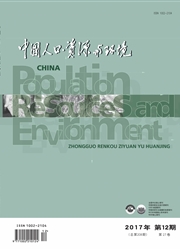

 中文摘要:
中文摘要:
1978年以来,我国开展了一系列大规模的生态修复项目,包括三北防护林工程、天然林保护项目、退耕还林还草工程等。为了讨论这些项目对社会经济和环境的综合影响、及其应用前景。本文通过相关文献综述与展评,研究环境修复政策与社会可持续发展之间的内在关系。30多年的实践经验表明,封山禁牧、退耕还林还草、天然林保护、以及其他环保政策使项目区的绿色植被覆盖度迅速提高。但是与撂荒地的自然恢复过程相比,半干旱地区植树造林降低了总的植被覆盖度,导致退化土地面积增加,加剧了当地的沙漠化;同时。由退耕引起的粮食减产部分可以通过在更适宜地区改进农业生产技术来补偿。退耕还林工程对中国的粮食安全没有造成负面影响。在大规模环境修复工程的实施过程中。中国人民对环保政策的态度也在平稳进步。与其相反。由于天然林保护项目所实施的禁采、禁牧政策缺少必要的补偿措施,对当地居民的生计造成一定的负面影响;而且,由于只有极少数人认为植树种草应该是农业可持续发展的首要目标,当退耕还林还草工程结束后。许多已修复的植被面临被再一次开垦的危险。由此可见。通过改进农业技术和提供适当的生态补偿,可以在改善环境和促进社会发展的同时避免贫困与环境恶化。同时,必须警惕不适当的技术和政策对环境和社会的危害。
 英文摘要:
英文摘要:
Since 1978, China has pursued some of the world' s most ambitious conservation and restoration programs. To evaluate potential links between China' s environmental policy and the country' s environmental and social sustainability, we reviewed published materials to provide a historical perspective on these programs and provide a preliminary assessment of their socioeconomic and environmental impacts. Based on this review, we discuss the potential applications of this approach. After 30 years of experience with these programs, the exclusion of livestock from overgrazed areas, the elimination of cultivation in marginal areas or on steep slopes, and the logging restrictions that have been implemented under the Grain for Green Project and the Natural Forest Conservation Program have led to rapid increase in total vegetation cover. In contrast, compared with the natural recovery processes in abandoned plots afforestation has often decreased the overall vegetation cover. With less vegetation to protect the soil, the degraded land expands intensifying the local desertification severity and potentially increasing sandstorm frequency. The decrease in total grain yield caused b,. eliminating cultivation in marginal areas has been compensated for by improved agricultural techniques in more suitable land. Durin implementation of these environmental projects, the attitude of Chinese citizens towards environmental conservation has steadil improved. However, most residents of project areas believed that their livelihoods are adversely affected by the logging and grazing bans. Therefore, much of the restored vegetation is at risk of being converted once more into farmland and rangeland when government compensation ends. Improving agricultural technology and providing both appropriate payments for ecosystem services and alternative forms of employment to farmers displaced by these programs can improve the environment and society while avoiding a cycle in which poverty leads to environmental destruction, which then deepens p
 同期刊论文项目
同期刊论文项目
 同项目期刊论文
同项目期刊论文
 期刊信息
期刊信息
